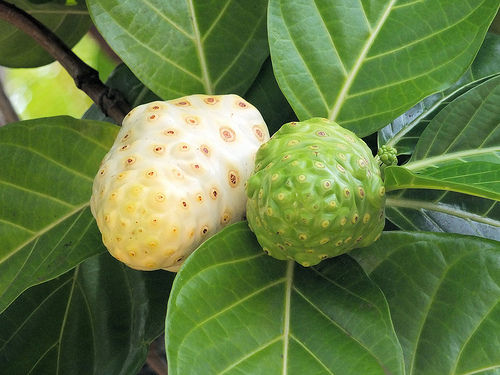You’ll be able to tell when some noni is in your fruit salad!
- Noni is a species of exotic tropical fruit that is native to northern Australia, Southeast Asia, and a number of the Pacific islands.
- ‘Noni’ is also known as ‘Indian mulberry’, ‘hog apple’, ‘great morinda’, ‘koonjerung’, ‘canary wood’, ‘beach mulberry’, ‘tokoonja’ and ‘cheese fruit’.
- The scientific name of the tree that produces noni is Morinda citrifolia and it is from the family Rubiaceae, the family of madder and coffee.
- Noni skin changes from green, to a pale yellow, then a creamy white colour when ripe, and is made up of many polygon shapes; while the flesh is also similar in colour.
- The irregular shape of the noni fruit ranges from 4 to 18 centimetres (1.6 to 7 inches) in length; and it contains many seeds, which can be roasted and eaten.
Noni
Image courtesy of Keith Roper/Flickr
- Noni is edible both raw and cooked, often eaten with salt or cooked in curry, and it is commonly made into juice; while jams and pickles can also be made from the fruit.
- Generally, noni emits a strong, undesirable smell, comparable to that of smelly cheese or even vomit; and the unripe fruit is commonly cooked as a vegetable.
- Typically noni has a flavour resembling sour pineapple possibly with some sweetness, though it can be bitter and unpleasant; and the fruit has been historically used in times of famine.
- Various illnesses including asthma, arthritis and cardiovascular issues have all be treated with noni, by using traditional medicine methods.
- Noni has significant quantities of potassium and vitamin C, particularly in its juice, and has other vitamins and minerals.
Bibliography:
Morinda citrifolia, 2016, Australian Native Plants Society (Australia), http://anpsa.org.au/m-cit.html
Morinda citrifolia, 2016, Wikipedia, https://en.wikipedia.org/wiki/Morinda_citrifolia
Morinda citrifolia – Noni: Life Sustaining Plant, 2016, Top Tropicals, https://toptropicals.com/html/toptropicals/plant_wk/noni.htm
Noni, 2016, National Center for Complementary and Integrative Health, https://nccih.nih.gov/health/noni






